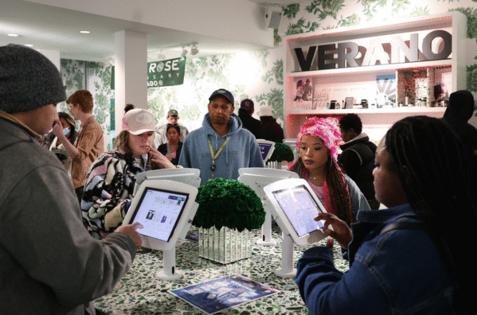82 cannabis stores opened in Illinois, but social equity owners remain on the margins
Published in News & Features
Eighty-two new cannabis stores opened in Illinois in the past fiscal year, marking “explosive growth” in sales outlets for an industry that surpassed $2 billion in sales, the state reported.
State regulators boasted in the 2024 annual report that “social equity” marijuana business owners, those who come from poor areas or who were most impacted by the war on drugs, now own nearly half of the 220 dispensaries statewide.
But social equity owners say they remain largely on the fringe of the industry, because the state favors previously existing big businesses. A state disparity report showed social equity businesses collected only 12% of statewide revenues in the past year.
“The structural imbalances have to be addressed,” said Peter Contos, deputy director of the Cannabis Equity Illinois Coalition.
While new social equity businesses typically own one or two stores, already-established multi-state operators own up to 10 each. And the large companies are authorized by law to have up to 15 times more growing space than new craft growers.
The report by the state’s Cannabis Regulation Oversight Office, or CROO, also highlighted the coming showdown over whether to regulate or ban the hemp industry. The report covered fiscal year 2024, which ended June 30.
While cannabis remains illegal under federal law, hemp was legalized federally if it has less than .3% delta-9-THC, the main component of the plant that gets users high. Hemp manufacturers have found ways to synthetically create variants such as delta-8-THC, which also get users high.
At least six states, including Missouri and California, have tried to ban or regulate hemp products, and are facing legal challenges. In Illinois, vape stores and gas stations sell hemp products without restrictions on age or other factors, while licensed cannabis operators are limited to age 21 and over, with strict regulations for testing and labeling.
Law enforcement is also seeing a “boom” in the sale of high-THCA content hemp flower, which is THC before it’s been heated for consumption, the report stated.
The U.S. Drug Enforcement Administration considers the synthesizing of THC illegal. Under state law, the synthesized product is categorized as “cannabis” and therefore should be controlled, the CROO reported.
But state police and local law enforcement have struggled to convince state’s attorneys to prosecute hemp cases, the report stated.
For that reason, state agencies have pushed for hemp regulations, with the report stating, “Clarification in legislation would certainly help.”
Hemp business owners have countered that they want to be regulated, but not as proposed previously, which they say would put them out of business.
On the cultivation side, the state Department of Agriculture is building a new lab to check private lab work analyzing pot products’ potency and purity. The lab is expected to open before the end of the year.
Looking ahead, regulators also plan to expand medical marijuana tax discounts to all dispensaries, overcoming opposition from some in the industry who want to keep the medical market only to the 55 originally licensed stores.
The restricted market is another example of favoritism for older companies, the equity coalition protested. “It’s far from where we need to be,” Contos said, “and we have a responsibility to get this back on the right track.”
____
©2024 Chicago Tribune. Visit at chicagotribune.com. Distributed by Tribune Content Agency, LLC.







Comments